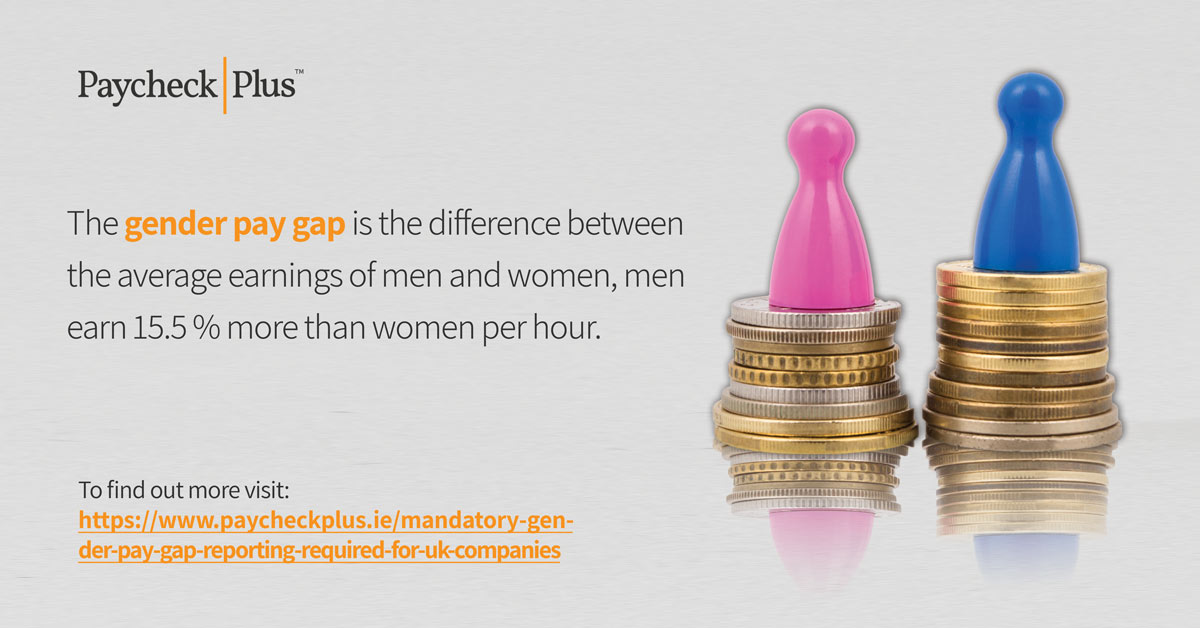
Mandatory Gender Pay Gap Reporting Required for UK Companies
Regarding the gender pay gap, employers in the UK with a headcount of more than 250 people:
- for public sector employers: midnight on 30 March
- for private and voluntary sector employers: midnight on 4 April

Mandatory gender pay gap reporting (UK)
Since 2019, organisations in the private or charitable sectors that have a headcount of more than 250 employees must publish and report specific figures about their gender pay gap.
The gender pay gap is the difference between the average earnings of men and women, expressed relative to men’s earnings. For example, ‘men earn 15.5 % more than women per hour’. (statista 2020)
Employers must both:
- publish their gender pay gap data and a written statement on their public-facing website (view the specific data that employers must publish from GOV.UK here)
- report their data to government online – this service has been available on GOV.UK since spring 2017.
Organisation can also publish and report voluntarily if their headcount is fewer than 250 employees.
‘Relevant employer’
Your organisation will be a ‘relevant employer’ and must publish and report if it has a headcount of more than 250 employees who are based in England, Scotland or Wales.
The legal entity that is the ‘relevant employer’ (for example, the private limited company or public limited company) must register with and report to the Gender pay gap reporting service. This online service will be available on GOV.UK in the spring.
If your organisation is a ‘relevant employer’ and runs multiple payrolls (for example payrolls for different departments or business functions), you must merge relevant data from all your payrolls and report one set of figures for your organisation.
Group structures
Organisations that are part of a group must report individually if they are ‘relevant employers’.
Additionally, corporate groups can voluntarily report combined figures for the entire group.
Who counts as an ‘employee’
The definition of ‘employee’ for gender pay gap reporting includes:
- people who have a contract of employment with your organisation
- workers and agency workers (those with a contract to do work or provide services)
- some self-employed people (where they must personally perform the work)
When to count agency workers and self-employed people in your organisation
If your organisation uses agency workers or service companies, they count as part of the headcount of the agency or service company that provides them – not your organisation.
You must include self-employed people in your organisation’s calculations if they must personally perform work for you and you have the data available. For example where a project initiation document exists and/or a schedule of fees is in place.
Part-time workers and job-sharing
You must count each part-time worker as one employee for gender pay gap reporting purposes.
If you use job-share arrangements, every employee within a job-share counts as one employee. So, if 2 people job-share, they count as 2 employees for gender pay gap reporting purposes.
When employees have more than one job with your organisation, you can either choose to count them according to how many employment contracts they have or as one employee. Your organisation can choose the most appropriate approach – but it will help the accuracy of your figures if you consistently apply what you decide.
Overseas workers and international jobs
As a general rule, you must count an employee based overseas if they have an employment contract subject to English, Scottish or Welsh law.
Partners in partnerships
You don’t have to include partners in traditional partnerships and limited liability partnerships in your calculations. This is because partners take a share of the organisation’s profits, which is not directly comparable with employees’ pay.
Data you must publish and report
You must publish on your organisation’s public-facing website and report to government your organisation’s:
- mean gender pay gap in hourly pay
- median gender pay gap in hourly pay
- mean bonus gender pay gap
- median bonus gender pay gap
- proportion of males and females receiving a bonus payment
- proportion of males and females in each pay quartile
You’ll need to:
- gather specific information from your payroll (for specific details required visit GOV.UK here)
- use this information to make your calculations (for more information on how to make your calculations visit GOV.UK here)
You must also publish a written statement on your organisation’s website which confirms the accuracy of your calculations, authorised by an appropriate senior person (such as a company director). To view what employers must publish visit GOV.UK here.
You are required by law to publish and report your organisation’s figures if you’re a ‘relevant employer’. The Equality and Human Rights Commission can enforce any failure to comply with the regulations.
(Source: GOV.UK)
For more related to Mandatory gender pay gap reporting read:
Celebrating Women Entrepreneurs
Tax Free Childcare and UK Employers
Paycheck Plus, Your Outsourced Payroll Provider
Paycheck Plus is an award-winning Irish payroll company that specialises in payroll outsourcing. With industry-leading accuracy levels, strict levels of confidentiality, our affordable payroll service provides comprehensive outsourced payroll solutions to organisations of all sizes.
Our award-winning payroll firm offers a specialist payroll service which ensures payroll accuracy. Our payroll services include WRC inspection assistance, payroll consultancy and redundancy management. While our bespoke payroll software lets you consolidate your payroll processes into one simple and efficient workflow
For more information on our Irish payroll services simply request a payroll quote or call our Irish payroll bureau on +353 (0) 1 905 9400
Alternatively, you can contact our UK payroll agency on +44 (0) 161 464 8720

Your guide to Irish auto-enrolment
Irish businesses are entering a transformative period in workplace pensions as they prepare to implement automatic-enrolment, which comes into play 1 January 2026. We’re here to provide clarity and support.
Budget 2026 at a glance: key payroll and finance changes you need to know
The 2026 Budget is the first under a new Government, and has been described as ‘sensible’ with the goal to…
